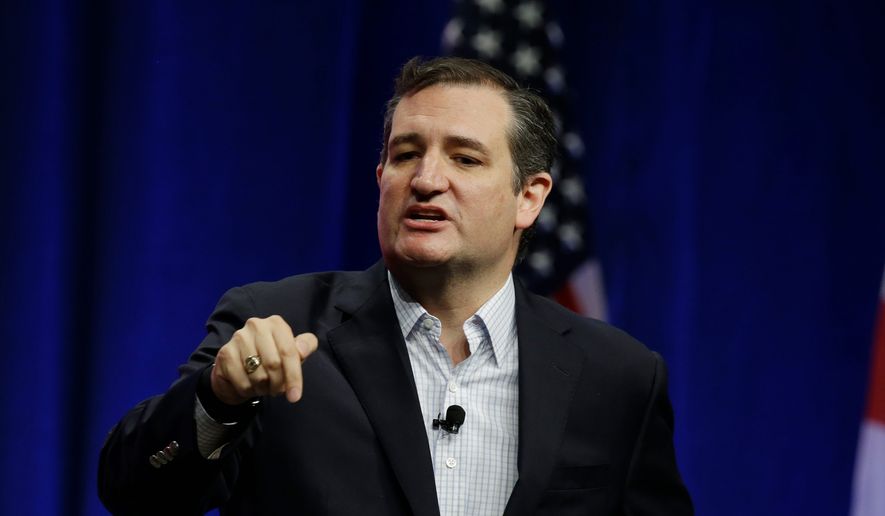Facing criticism over his anti-terror plans, GOP presidential contender Sen. Ted Cruz said Thursday he would wipe out the Islamic State by stepping up airstrikes and arming Kurdish forces to handle the ground work — though he left the door open for U.S. troops.
The question of American ground troops has become a critical divide in the presidential campaign as the terrorist attacks in Paris and California have raised the fight against the Islamic State in voters’ minds, and the candidates strive to develop policies that project strength and carve out political space.
Speaking at the Heritage Foundation, Mr. Cruz said if military commanders say U.S. combat troops are needed, he’s open to their advice.
“We should do whatever is necessary to defeat ISIS,” Mr. Cruz said, using an acronym for the Islamic State.
The Texas Republican finds himself straddling the line, even as much of the GOP field is fully in favor of ground troops, arguing that only a U.S. presence can ensure the defeat of the Islamic State. The Islamic State has broken new ground for a terrorist organization by declaring a caliphate and controlling a large part of territory in Iraq and Syria.
Ohio Gov. John Kasich says fast action is needed, and that means immediate deployment of U.S. combat troops as part of an international coalition targeting the Islamic State.
SEE ALSO: Congress rushes to pass spending extension to avert shutdown
“Mark my words: We will all be on the ground sooner or later. Sooner is better than later,” Mr. Kasich said in a speech at the Council of Foreign Relations in New York Tuesday.
Former Florida Gov. Jeb Bush also supports more ground troops, along with retired neurosurgeon Ben Carson, businessman Donald Trump and former Arkansas Gov. Mike Huckabee.
South Carolina Sen. Lindsey Graham and former Sen. Rick Santorum of Pennsylvania have arguably been the most detailed, calling for an international effort that includes 10,000 American troops.
On the other side is Sen. Rand Paul of Kentucky, who has warned against sending ground troops, and against arming rebel forces in Syria.
Then there are those in the middle, with Mr. Cruz — Sen. Marco Rubio of Florida, New Jersey Gov. Chris Christie and Carly Fiorina — who are pushing the idea that the U.S. must support allies in the region through a mix of weapons, intelligence sharing, air support and embedded special operation forces before considering putting more combat troops on the ground.
The debate within the GOP mirrors the broader fight between a more aggressive foreign policy, advocated by hawks, and a more reluctant policy, favored by libertarian and isolationist factions.
SEE ALSO: Donald Trump promises to mandate death penalty for those who kill police officers
“Most of the candidates would agree to a ground forces or special ops forces of some sort — except Rand Paul — and most would say those forces need to be part of a bigger coalition including Arab partners. But they’d differ on how many and in what role,” said KT McFarland, a Fox News analysts who held national security posts under Presidents Nixon, Ford and Reagan. “This is part of the bigger debate that has raged in the Republican Party since Reagan, if not before,” she said.
Since getting elected to the Senate in 2012, Mr. Cruz has argued that his views are in line with Reagan and tried to straddle to two poles of thinking, describing his views on national security falling somewhere between the libertarian-leaning Mr. Paul and the more hawkish Mr. Graham.
On Thursday, Mr. Cruz delivered a similar message, saying the U.S. is better off staying out of the civil war in Syria, while also keeping the door open to boots on the ground in the Middle East and defending his support of the USA Freedom Act, which changed the way the intelligence agencies conducted surveillance and gathered data.
Mr. Cruz said he would take a page out of the Reagan playbook by unapologetically defending the nation’s interest on the world stage, but also recognizing the use of power should be tied to the realities of the world.
“Some in the course of a political campaign have focused on the question of boots on the ground as a talismanic demonstration of strength,” Mr. Cruz said. “This is not a game of Risk, where politicians move armies around to demonstrate their machismo.”
“Instead you need a commander in chief who sets an objective of destroying ISIS and then we need to rely on the expert military judgment as to the tool necessary to carry out that objective, including overwhelming military power, including arming the Kurds, including using whatever ground troops are necessary to kill the terrorist and then come home,” he said.
The debate is also playing out on the intelligence front, with the expiration last month of the National Security Agency’s phone-snooping program, thanks to passage of the USA Freedom Act earlier this year.
Mr. Rubio voted against that bill, saying the NSA’s program to collect and analyze Americans’ phone metadata was too valuable. Mr. Cruz supported the bill, saying the phone program needed to end. And Mr. Paul voted against the bill — because he said it didn’t go far enough to rein in the NSA.
Mr. Bush and Mr. Christie have also called for renewing the NSA’s program.
At Heritage on Thursday Mr. Cruz defended his vote, saying the USA Freedom Act, which President Obama signed into law over the summer, strikes a better balance between national security and individual rights.
“When the focus of law enforcement and national security is on law abiding citizens, rather than targeting the bad guy, we miss the bad guys, while violating the Constitution Rights of American citizens,” he said.
• Seth McLaughlin can be reached at smclaughlin@washingtontimes.com.




Please read our comment policy before commenting.